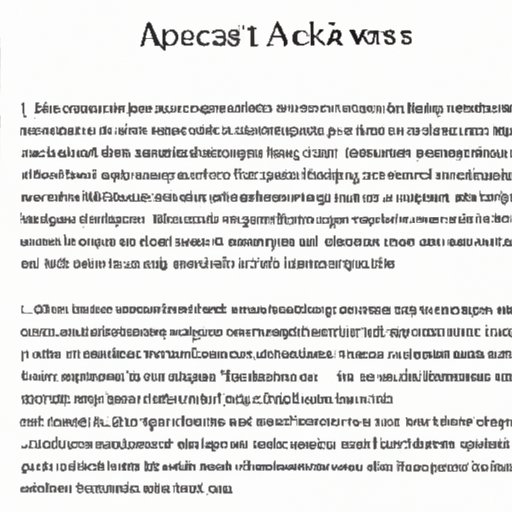Introduction
Academic writing is the process of communicating new ideas, analyzing data, and presenting arguments in a clear and concise manner. It is an essential skill for students and professionals alike, as it helps them effectively communicate their thoughts and opinions to others. The purpose of academic writing is to inform, persuade, or explain a particular topic or subject. In order to be successful, students must understand the fundamentals of academic writing and possess the necessary knowledge and skills to produce quality work.
An Overview of Academic Writing: What is It and Why Is It Important?
Academic writing is the formal style of communication used by scholars and academics when discussing topics related to their field of study. It is characterized by precise language, rigorous logic, and an objective point of view. Academic writing is often used to present information in a structured and organized fashion, as well as to assess the quality of the writer’s argumentation. It is also used to evaluate the student’s ability to think critically and form conclusions based on evidence.
The benefits of academic writing are numerous. It enables students to develop their critical thinking skills, learn how to formulate and defend arguments, and practice expressing complex ideas in a concise and coherent manner. Furthermore, students who are familiar with the conventions of academic writing will have an easier time preparing for exams and entering the workforce. Academic writing is an invaluable tool that can help students become more successful in their future endeavors.
There are several different types of academic writing, including essays, research papers, lab reports, case studies, and dissertations. Each type of writing has its own set of rules and guidelines that must be followed in order to produce quality work. For example, essays typically require students to make a point and support it with evidence, while research papers involve gathering evidence from a variety of sources and synthesizing it into a coherent argument.

How to Improve Your Academic Writing Skills
Improving your academic writing skills is not as difficult as it may seem. Start by identifying areas of weakness in your current writing. Are you having difficulty finding reliable sources? Do you struggle with grammar and punctuation? Once you have identified the areas that need improvement, begin reading assignments from different disciplines and practice editing and proofreading your work. Additionally, seek feedback from peers or professors to get an idea of what needs to be improved.
10 Tips for Writing an Effective Academic Paper
Writing an effective academic paper requires careful planning and attention to detail. Here are 10 tips to help you write a successful paper:
- Develop a clear structure so that readers can easily follow your ideas.
- Use appropriate vocabulary to ensure your points are understood.
- Establish arguments logically to support your thesis statement.
- Avoid plagiarism by citing sources accurately.
- Follow formatting guidelines to ensure your paper looks professional.
- Use grammar correctly to improve readability.
- Maintain clarity by avoiding overly complex sentences.
- Stay focused on the topic throughout the entire paper.
- Revise and edit your work to eliminate errors and inconsistencies.
Academic Writing vs. Other Types of Writing
It is important to note that academic writing is distinct from other types of writing, such as creative or business writing. Non-academic writing is more informal and typically follows a narrative structure. It is often written to entertain or persuade an audience. The key difference between the two is that academic writing is based on evidence and facts, while non-academic writing relies more heavily on opinion and emotion.
Having an understanding of both types of writing can be beneficial. Knowing how to write academically can help you craft compelling arguments and make sound decisions, while knowing how to write creatively can help you express yourself in unique and interesting ways.

Common Mistakes to Avoid When Writing Academically
Writing academically can be challenging, and it is easy to make mistakes. Here are some of the most common errors to avoid when writing academically:
- Grammatical errors, such as incorrect verb tense or subject-verb agreement.
- Poor organization, which can make it difficult for readers to follow the argument.
- Inaccurate citations, which can lead to accusations of plagiarism.
- An unclear thesis statement, which can make it difficult for readers to understand the main point of the paper.
- Overusing the passive voice, which can make the writing sound dull and uninteresting.

The Benefits of Academic Writing
Academic writing can be difficult, but it has many rewards. Here are some of the benefits of academic writing:
- Improved critical thinking skills, as writing forces you to analyze and evaluate evidence.
- Better communication skills, as you learn how to express complex ideas in a clear and concise manner.
- Increased confidence, as you gain an appreciation for your knowledge and abilities.
Strategies for Developing a Research Question or Thesis Statement
Developing a research question or thesis statement is an important step in the writing process. To get started, brainstorm potential ideas and then narrow down the focus. Consider relevant factors, such as your interests, the scope of the project, and any instructions from your professor. Finally, draft a preliminary thesis statement and use it as a guide for the rest of the writing process.
Conclusion
Academic writing is a crucial skill for success in college and beyond. By understanding the fundamentals of academic writing and following the tips outlined in this article, you can improve your writing skills and confidently tackle any assignment. Whether you are writing an essay, research paper, or dissertation, the ability to effectively communicate your thoughts and ideas is an invaluable asset.
(Note: Is this article not meeting your expectations? Do you have knowledge or insights to share? Unlock new opportunities and expand your reach by joining our authors team. Click Registration to join us and share your expertise with our readers.)
